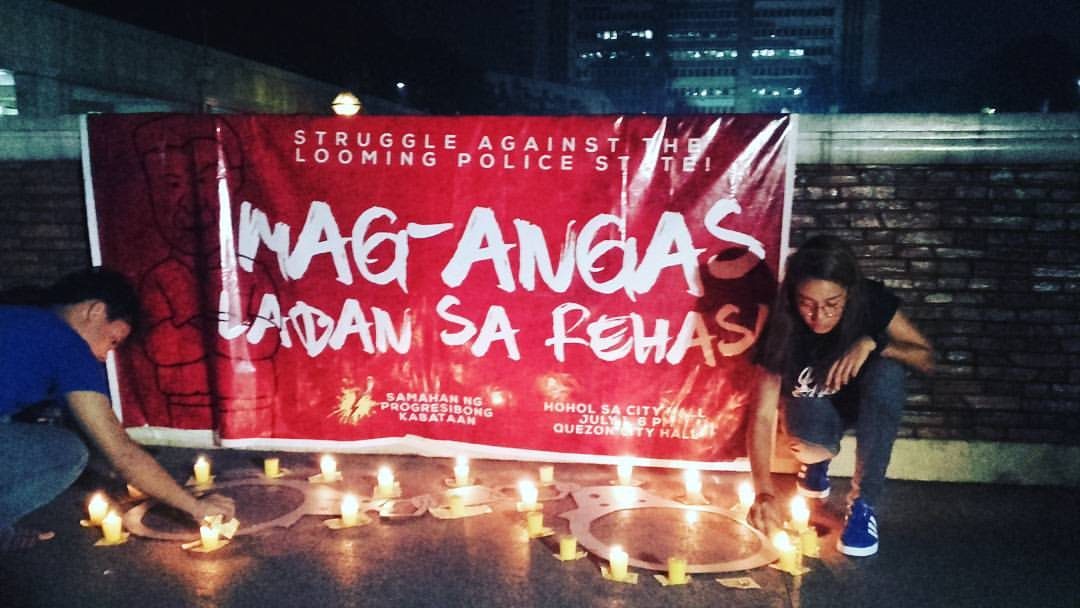SUMMARY
This is AI generated summarization, which may have errors. For context, always refer to the full article.

MANILA, Philippines – A group of students gathered in front of Quezon City Hall on Friday night, July 1, to oppose the curfew ordinances that prohibit minors to go outside of their houses after a certain time at night.
Samahan ng Progresibong Kabataan (SPARK), established in 2015, protested the implementation of various ordinances in Metro Manila dubbed as “Oplan RODY,” or “Rid the Streets of Drunkards and Youths.”
The acronym was in reference to a nickname of newly-inducted president Rodrigo Roa Duterte, whose election campaign boasted a platform anchored on peace and order.
Joanne Lim, spokesperson for SPARK, said in an interview, that while these ordinances claim to protect minors from being victims of crime, these individuals are rather presumed criminals.
“When they’re outside during curfew hours, they have to prove that they’re working students, (or) that they came from some place that is very valid. So in that sense, what happens is that you have to prove that you’re innocent,” Lim said in a mix of English and Filipino.
She added that the ordinances does not take into account the changes brought about by the K to 12 basic education program.
“(The ordinances) fail to recognize that there are different realities faced by different communities. We have communities which have K to 12, and we have many non-K to 12-ready schools, so in that sense, there are many multiple shifts. And with multiple shifts, we have students who will go late at night,” she added.
Lim noted that if these regulations claim to protect the youth, they should just be brought to their homes rather than to the police.
“The most vulnerable are the poor communities because we never see Oplan RODY operated in the more privileged communities. When we talk to the youth of that community, they really have a traumatic experience when we talk about the police. Like if they hear sirens, they would feel nervous,” Lim said.
The local governments of Las Piñas, Pasay, Manila, Mandaluyong and Caloocan have started implementing ordinances to keep minors off the streets at night. According to a report, youth offenders were made to do push-ups in Las Piñas, while a harsher penalty of jailing the minors was imposed in Caloocan.
Status crime
Lawyer activist Luke Espiritu, who was also present in the camp out, explained that the curfew ordinances put into question are illegal under Republic Act 9344 or the Juvenile Justice and Welfare Act of 2006.
“Under that law, you cannot punish children because of their status as children. Meaning to say, if an adult does not commit any crime when he goes out late at night beyond 10 PM, then children should not be considered to have committed a crime for the same offense,” he said.
Punishing minors, he noted, is a “status crime” according to the law. Espiritu also said that these ordinances can be questioned under the Constitution for being “unreasonable” and not being “intrinsically valid.”
“If you look at the ordinances, what are the declared objectives? They say we should implement this because of crime. Now we can see how unreasonable these ordinances are. Because there is no reasonable connection between criminality and curtailing the rights of children,” the lawyer added.
The alternative
SPARK proposes that instead of making Oplan RODY a nationwide regulation, imposing policies must rather be community-based.
“The situations of different communities must be recognized. There must be a consultation with civil society organizations and as well as the youth because they are the primary ones involved here. This must also be in coordination with the CHR (Commission on Human Rights) and the DSWD (Department of Social Welfare and Development),” Lim said.
Espiritu added that the group plans to file a petition on the Supreme Court on July 11.
“We cannot question the constitutionality of Oplan RODY, it’s just an oplan. We’ll have to put in the specific ordinances, question their legitimacy. But we’ll also generalize it. Like there are general attributes of these ordinances, like curfew,” Espiritu said. – Rappler.com
Dwight Angelo De Leon is the president of DZUP Radio Circle, the official student organization arm of UP Diliman’s official AM radio station, DZUP 1602. He is also currently an intern for Rappler.
Add a comment
How does this make you feel?
There are no comments yet. Add your comment to start the conversation.